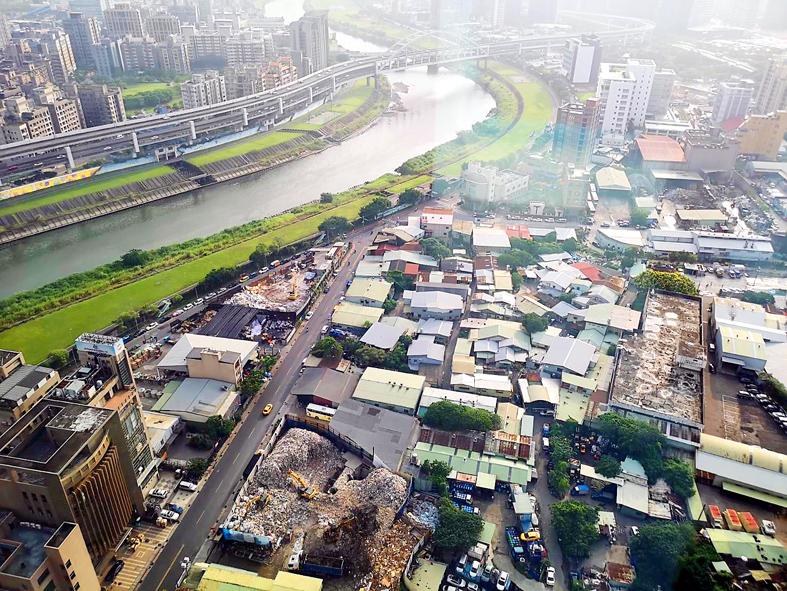Taiwan’s industrial property transactions grew 34.6 percent to a record high of NT$59.3 billion (US$2.11 billion) in the first half of this year, driven by strong demand for industrial plots of land, as well as factories and logistics facilities, CBRE Taiwan said yesterday.
The self-occupancy needs of technology and non-technology firms underpinned the robust showing that could extend into the second half of the year, despite a domestic COVID-19 outbreak, the broker said.
“Self-occupancy demand accounted for NT$42.7 billion of deals, a sharp increase of 69 percent from the same period last year, unaffected by the COVID-19 level 3 alert that is chilling consumer activity and slowing overall property transactions,” CBRE Taiwan research head Ping Lee (李嘉玶) said in a report.

Photo: Hsu Yi-ping, Taipei Times
Among the deals, MediaTek Inc (聯發科), the world’s biggest supplier of 5G smartphone chips, bought an office building in Taipei’s Neihu District (內湖) for its research-and-development department for NT$3.26 billion and Kinsus Interconnect Technology Corp (景碩科技), a silicon substrate maker, acquired a 44,000 ping (145,455m2) plot of land in Taoyuan for NT$4.48 billion to expand its capacity.
The trend also drew the attention of local constructions firms, who have poured money into the development of science parks, a further sign that this segment of the property market would continue to thrive, Lee said.
Costs for industrial plots of land nationwide average NT$137,000 per ping, a mild increase of 2.3 percent from last year, CBRE Taiwan said, adding that the increase is more than 4 percent for plots in central and southern Taiwan, while it is smaller than 1 percent in northern Taiwan.
Land prices have soared in northern Taiwan in recent years, but they remain relatively affordable at lower than NT$100,000 per ping elsewhere, Lee said.
The central bank has lowered the loan-to-value ratio for land deals to 55 percent to make hoarding land more expensive, Lee said, after companies seeking to shift production lines back to Taiwan from overseas complained about a shortage of land.
CBRE Taiwan real estate appraisal head Winston Shih (施甫學) said that office building upgrades and urban renewal projects would dominate land deals in northern Taiwan in light of a lack of supply.
Old factories in New Taipei City and Taoyuan would become the next hot spots, Shih said, predicting that solid demand would see the price of land in central and southern Taiwan increase by more than 5 percent.

UNCERTAINTY: Innolux activated a stringent supply chain management mechanism, as it did during the COVID-19 pandemic, to ensure optimal inventory levels for customers Flat-panel display makers AUO Corp (友達) and Innolux Corp (群創) yesterday said that about 12 to 20 percent of their display business is at risk of potential US tariffs and that they would relocate production or shipment destinations to mitigate the levies’ effects. US tariffs would have a direct impact of US$200 million on AUO’s revenue, company chairman Paul Peng (彭雙浪) told reporters on the sidelines of the Touch Taiwan trade show in Taipei yesterday. That would make up about 12 percent of the company’s overall revenue. To cope with the tariff uncertainty, AUO plans to allocate its production to manufacturing facilities in

TAKING STOCK: A Taiwanese cookware firm in Vietnam urged customers to assess inventory or place orders early so shipments can reach the US while tariffs are paused Taiwanese businesses in Vietnam are exploring alternatives after the White House imposed a 46 percent import duty on Vietnamese goods, following US President Donald Trump’s announcement of “reciprocal” tariffs on the US’ trading partners. Lo Shih-liang (羅世良), chairman of Brico Industry Co (裕茂工業), a Taiwanese company that manufactures cast iron cookware and stove components in Vietnam, said that more than 40 percent of his business was tied to the US market, describing the constant US policy shifts as an emotional roller coaster. “I work during the day and stay up all night watching the news. I’ve been following US news until 3am

Taiwan will prioritize the development of silicon photonics by taking advantage of its strength in the semiconductor industry to build another shield to protect the local economy, National Development Council (NDC) Minister Paul Liu (劉鏡清) said yesterday. Speaking at a meeting of the legislature’s Economics Committee, Liu said Taiwan already has the artificial intelligence (AI) industry as a shield, after the semiconductor industry, to safeguard the country, and is looking at new unique fields to build more economic shields. While Taiwan will further strengthen its existing shields, over the longer term, the country is determined to focus on such potential segments as

COLLABORATION: Given Taiwan’s key position in global supply chains, the US firm is discussing strategies with local partners and clients to deal with global uncertainties Advanced Micro Devices Inc (AMD) yesterday said it is meeting with local ecosystem partners, including Taiwan Semiconductor Manufacturing Co (TSMC, 台積電), to discuss strategies, including long-term manufacturing, to navigate uncertainties such as US tariffs, as Taiwan occupies an important position in global supply chains. AMD chief executive officer Lisa Su (蘇姿丰) told reporters that Taiwan is an important part of the chip designer’s ecosystem and she is discussing with partners and customers in Taiwan to forge strong collaborations on different areas during this critical period. AMD has just become the first artificial-intelligence (AI) server chip customer of TSMC to utilize its advanced